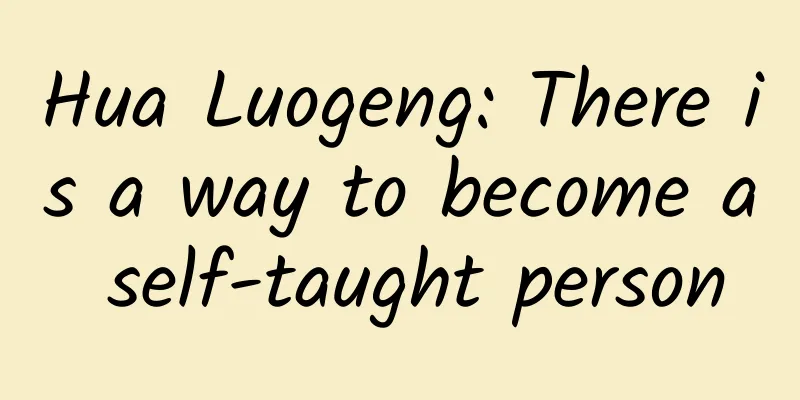Hua Luogeng: There is a way to become a self-taught person

|
November 12th is the 111th birthday of Hua Luogeng, a famous Chinese mathematician and academician of the Chinese Academy of Sciences. Hua Luogeng dropped out of school when he was young due to poverty and his legs were disabled due to illness, but he relied on self-study to become one of the most influential Chinese mathematicians in the world. Whenever people praised him as a mathematical genius, he humbly said: "Genius comes from accumulation, and intelligence comes from diligence." Hua Luogeng liked to use his brain since he was a child, and was often nicknamed "Luo Dazi" because he concentrated on thinking about problems. After graduating from junior high school, he entered Shanghai Zhonghua Vocational School. He dropped out of school because his family was poor and could not afford the tuition. However, he taught himself all the mathematics courses in high school and lower grades of university in 5 years. When he was 20 years old, he published a paper that made a sensation in the mathematics world. Xiong Qinglai, the director of the Department of Mathematics at Tsinghua University, broke the convention and allowed Hua Luogeng, who only had a junior high school diploma, to work at Tsinghua University. He was promoted to lecturer four years later. After returning from studying in Cambridge in 1937, he became a full professor at Tsinghua University. After that, he published dozens of works, founded the Chinese mathematics school, and led it to the world level. Keep your feet on the ground and persevere Hua Luogeng had difficulty walking, but he said, "I want to use a sound mind to replace my imperfect legs." With his indomitable spirit, he became a master of mathematics. In addition to mathematics papers, he also wrote many popular science books, one of which was a mathematics enlightenment book for teenagers called "Intelligence lies in diligence, genius lies in accumulation", which reflects his learning attitude. Mr. Hua believes that there is no magical method to study, and that one cannot take shortcuts in learning. One must recognize the long-term and arduous nature of learning. Whether it is the path of scientific research or learning, you need to be fearless and persistent in order to reach the pinnacle of glory. It is better to read a book from beginning to end and be proficient in it than to read ten or eight books without understanding them thoroughly. The so-called proficiency is not only to be able to recite and calculate, but also to master the basic spirit and basic principles, to be able to apply them flexibly, and to pay attention to its coherence, and to study one book at a time according to the depth. Don't be impatient, chew slowly. If the foundation is not solid, and you don't understand it halfway, it will be like eating half-cooked rice when you apply it, and you can't use it freely. "It is extremely difficult to reach the sky in one step, but it is not difficult to take every step firmly." He once quoted a sentence from the Doctrine of the Mean: "If someone can do something once, I should do it ten times; if someone can do something ten times, I should do it a hundred times" to express the importance of diligence. This sentence means that if others can do it once, I should do it ten times; if others can do it ten times, I should do it a hundred times. "If you can really do this, even if you are stupid, you will become wise; even if you are weak, you will become strong." He also wrote a poem to encourage young people: "It is better to work hard early, and it is better to work hard late. The worst thing is not to work hard, otherwise you will be ignorant all your life. Work hard and make great efforts. Those who talk big will have a future full of thorns." Read thick books first and then thin books Being down-to-earth needs to be combined with independent thinking. Hua Luogeng was self-taught. When he studied every question and every chapter in the book, he not only looked at the book, but also looked at what was behind the book. The book refers to the conclusion and principle, and what is behind the book is to imagine how scientists deduced it. At the same time, you may also want to further imagine whether you can use other methods to reach this conclusion. In other words, when reading, you should know the fact and the reason. Knowing one thing, you should also know the other. Regarding reading, Mr. Hua once said a famous saying: "Read thick books first and then thin books." This includes two learning processes: one is "from thin to thick", and the other is "from thick to thin". The former means that learning should accumulate little by little, integrate and master, and proceed step by step; the latter is to organize and summarize, summarize the key points, grasp the key points, and form your own logic. This process from "thin" to "thick" and then to "thin" was summarized by Hua Luogeng: "After chewing every problem in the book and truly understanding it, it is necessary to further connect the contents of the various parts of the book to understand and integrate them, so as to figure out what the main problems in the book are and the relationship between the various problems. In this way, we can grasp the basic clues that command the entire book and run through the spiritual essence of the book." Experience the joy of innovation Regarding the study of mathematics, many people think that mathematics is difficult and boring. Mr. Hua said: "Viewing mathematics as a pile of formulas, theorems as dogmas to be memorized, explanations as deductions of formal logic, and exams as rote memorization and mechanical application of standard answers without daring to go beyond the line, how can such a situation not be rigid and inflexible!" This means not seeing the beauty of mathematics and not experiencing the joy of learning mathematics. "Mathematics develops along with science, so how can it die? Mathematics itself is magnificent, colorful, and fascinating. When you can't figure out a problem, you may feel distressed, but if you suddenly figure it out, isn't it sweet? How is it different from the enjoyment of music and dance? If you can come up with some new methods in addition to the established ones, it will be even more joyful." Dare to compete with the strong Modern education often says that it should be based on the interests of children. In fact, "interest can be cultivated. There is no need to be afraid of difficulties or troubles. Rigidity cannot scare people. What's more, the facts are not like this. If you don't believe it, please put in some effort and give it a try. Once you find the right path, confidence will come naturally and motivation will follow." This is true for mathematics, and it is also true for learning other subjects. Mr. Hua also said: "If you want to show off your skills in front of a master, you should go to a master to play chess." This was jokingly called the "show off your skills in front of a master" learning method by later scholars. Mr. Hua meant that you should not be afraid of exposing your shortcomings and dare to compete with the strong. He said: "Don't be afraid of low, just be afraid of not knowing the bottom." Don't be embarrassed, don't pretend to know when you don't know, don't be afraid of others saying: "You don't even know this?" "The teacher has said it many times." You should be thin-skinned in life, but you should be "thick-skinned" in learning. As the saying goes, don't be ashamed to ask questions. Only by exposing your weaknesses and shortcomings can the teacher teach you according to your aptitude and guide you in a targeted manner. |
<<: World Toilet Day丨Today is a big day with a savory taste!
>>: The longest train in China runs every 12 minutes on average.
Recommend
Cheyun: The 2022 new energy city sales ranking is released. Shanghai ranks first with cumulative sales of 188,000 vehicles
Insurance data show that in the first nine months...
How can a new brand build a live streaming system from 0 to 1?
After my first contact with the short video commu...
Zhulu Video Account 1.1 Operator Practical Operation Course New Platform New Opportunities, Build a Private Domain Traffic Position!
Zhulu Video Account 1.1 Operator Practical Operat...
China Charging Alliance: Operation status of national electric vehicle charging and swapping infrastructure in July 2023
Operation status of national electric vehicle cha...
To quickly and effectively increase real reviews on the App Store, don’t ignore these six points!
No matter how the industry spreads that reviews a...
Students can't eat snacks? The more nutrition you have, the taller you grow? Explain 8 misconceptions about student nutrition
Are foods labeled "children's food"...
Second spacewalk! Chinese astronauts will celebrate New Year's Eve in space for the first time!
According to the China Manned Space Engineering O...
After reading this, do you still think product operation is a simple job?
I have always wanted to give a systematic definit...
Alibaba established Pingtouge chip company named by Jack Ma
At this year's Yunqi Conference, Alibaba anno...
World Thalassemia Day: Difficult to treat but preventable! 9 pictures to help you understand thalassemia
May 8, 2023 is the 30th World Thalassemia Day (Wo...
1,000 km range and super fast charging become a reality, GAC Aion expects to double its production capacity next year
If you ask which domestic new energy vehicle bran...
This article will guide you from 0 to 1 to build an overseas operation and promotion system!
How to build an overseas operation and promotion ...
What is the difference between the Lunar South Pole Station and the Earth's South Pole Station?
China has five scientific research stations at th...









